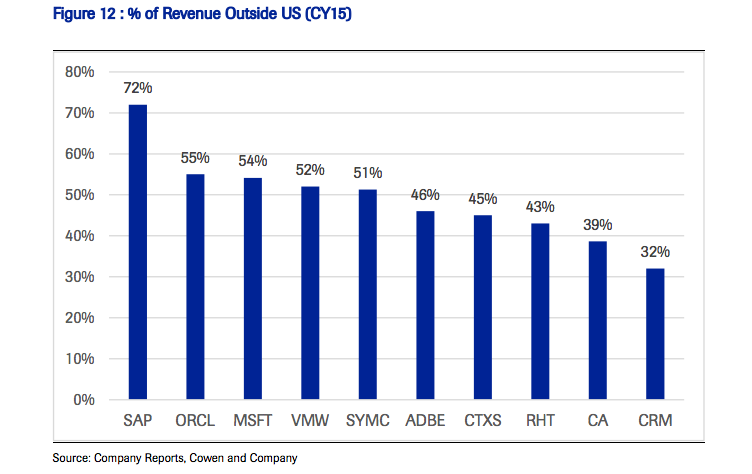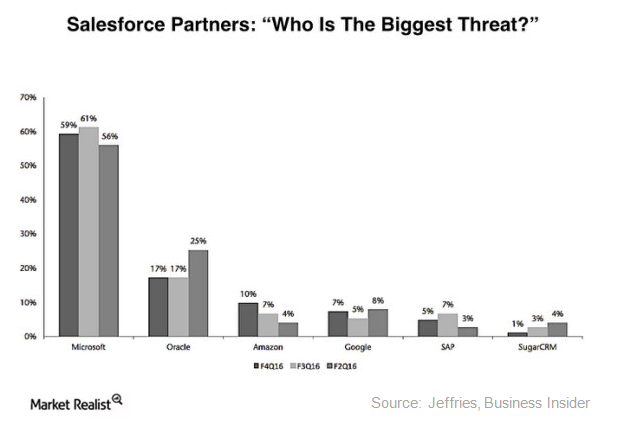
The fight between Google, Microsoft, and AWS (with IBM and Oracle fighting for scraps) is the major news trend of the week.
Microsoft announced a partnership with GE that will introduce their Predix IoT engine into the Azure cloud. Meanwhile, Google’s Diane Greene says Google can beat AWS and Microsoft in almost any RFP because they know cloud the best. Amazon said the origins of their cloud infrastructure was a reaction to legacy IT providers “not caring”, especially once the sale was inked.
While cloud was a major topic, HPE once again is making headlines for exploring the possibility of selling off some of their enterprise software (seriously… this again?).
IBM
- Inside IBM’s New App-Building Training Ground
While the New York garage is similar to the others IBM has in cities like Toronto, San Francisco, and London, IBM is specifically making an open pitch to blockchain developers. Blockchain is a technology made famous by bitcoin, which has a public digital ledger for every transaction performed that can be shared among a distributed network. Many companies are tinkering with blockchain because it could change the way digital transactions are performed. IBM says this is because it sees an increased need for training and leadership when it comes to this burgeoning technology. Financial services—along with multiple other industries—are trying to figure out ways they can use this new system (which was introduced to the world thanks to bitcoin), and implement it into their system. Many New York-based companies are trying to figure out what they can do. While there’s a blockchain focus in the New York garage, the space isn’t exclusively for that technology.
http://www.fastcompany.com/3061668/the-future-of-work/inside-ibms-new-app-building-training-ground
- OpenText CEO Takes Aim at IBM Watson #OTEW
“Our path on software is pure openness: open standards and open algorithms,” Barrenechea said. “IBM’s platform is closed. Our hardware is built open standard x86. You can chose your vendor, and you can choose your design. With IBM Watson, it’s closed. You use the Watson mainframe when you’re there.”
http://www.cmswire.com/information-management/opentext-ceo-takes-aim-at-ibm-watson-otew/
IBM Responds:Reached by CMSWire after Barrenechea’s comments, IBM Watson Chief Technology Officer Rob High said the cognitive APIs and services on the Watson platform are available to any developer who wants to build a Watson application.
“These APIs are available to the public on our Watson Developer Cloud,” he said, “but we’re expanding to other platforms as well.”
- Microsoft and IBM in a deal to push Surface devices to enterprises
I wonder how IBM’s buddies at Apple feel about this… not well I imagine.For IBM, the deal is much like the one it struck with Apple in 2014 to develop apps for iPhones and iPads. IBM will acquire more enterprise software customers, and it won’t have to worry about supporting the hardware.
The IBM custom software will take advantage of unique Surface features, Microsoft said. The applications will revolve around analytics, reporting, employee productivity, management and forecasting.
Microsoft
- Microsoft wins landmark data storage case
A unanimous decision from the Second Circuit Court of Appeals ruled that Microsoft did not have to turn over documents from an email account stored in an Irish data center despite a 2013 warrant.
“We have little trouble concluding that execution of the Warrant would constitute an unlawful extraterritorial application of [the U.S. authority],” wrote Circuit Judge Susan L. Carney in the official opinion.
http://thehill.com/policy/cybersecurity/287763-microsoft-wins-landmark-data-storage-case
- Yes, Windows 10 subscriptions are coming, at least for enterprise
Beginning this fall, Microsoft will offer Windows 10 Enterprise E3, a special enterprise tier of Windows 10 that will cost $7 per user per month. Yusuf Mehdi, the corporate vice president of the Windows and Devices Group at Microsoft, said cloud providers would now be able to offer three premier Microsoft services on a subscription basis: Microsoft’s Azure, Office 365, and now Windows 10.
“For the price of a cup of coffee and a donut per day, you can get enterprise-class security on a per-user subscription basis,” Mehdi said onstage at Microsoft’s Worldwide Partner Conference in Toronto, Canada. “If you’re a cloud provider, this is now phenomenal.”
I love the “cup of coffee” line… it is a total diversion tactic.

http://www.pcworld.com/article/3094785/windows/yes-windows-10-subscriptions-are-coming-at-least-for-enterprise.html - Instant Analysis: GE Brings Its Predix Industrial Software to Microsoft’s Cloud
Predix is one of GE’s major investments in the Internet of Things, and it allows companies to manage and analyze industrial equipment (jet engines, factory machines, etc.) to improve their efficiency and reduce downtime.
“Bringing Predix to Azure means those same customers will now have access to additional capabilities such as natural language technology, artificial intelligence, advanced data visualization and enterprise application integration,” Microsoft and GE said in a press release.
The companies said Predix will also be integrated with Microsoft’s Azure IoT Suite, Cortana Intelligence Suite, Office 365, and other services, so that Predix customers can access industrial data in their business software.
- Kevin Turner’s departure from Microsoft generates cries of happiness from employees
Microsoft’s Executive Vice President for its Windows and Devices group also received negative opinions from some of its employees. Over 60% of the employees believe Turner was fired, although that wasn’t the case, and a mini-poll shows that 93 out of 95 of them felt “crazy happy” about this. Only two seemed to feel “crying sad”. Turner was known for being pretty rough, similar to ex-CEO Steve Ballmer, who was also known for being quick to throw anger around, especially as Turner was brought in whilst Ballmer was at the throne.
Hewlett Packard Enterprise | HP Inc
- HPE Is Said to Consider Selling Some of Its Software Assets
The divestitures would come from a portfolio of acquisitions made over roughly the last decade, including Autonomy, Mercury Interactive and Vertica Systems, said the people, who asked not to be identified because the matter is private. A sale process is in the preliminary stages and may not result in any deals, the people said.
http://www.bloomberg.com/news/articles/2016-07-08/hewlett-packard-enterprise-said-to-mull-selling-software-assets
HPE reportedly plans to flog Autonomy in bid to reduce mounting debtThe first annual report of the new company following the demerger of the HP Inc PCs and printers business indicated that HPE would focus software on big data analytics and applications, enterprise security, application testing and delivery management, and IT operations management solutions.
Oracle
- Oracle’s $9B Lawsuit with Google Sees New Development
Per media reports, last Wednesday Oracle appealed to the San Francisco U.S. District Court to reconsider the verdict. The filing stated that “Google’s financial rewards are as ‘conspicuous’ as they come, and unprecedented in the case law.” Oracle claims that Google has gained over $42 billion from Android powered by its Java APIs and therefore demanded a share of its profit.
However, Google had earlier defended itself saying that the Java code was free and open and there have been no copyright infringements. In fact, Google’s stance was also supported by a majority of the Java programming community (including most of Silicon Valley) which believed that a decision in Oracle’s favor could prove detrimental to innovation as programmers use open source APIs across various interfaces for developing codes.
http://finance.yahoo.com/news/oracles-9b-lawsuit-google-sees-150603905.html
Storage (EMC | Dell )
- John Byrne becomes president of Dell and EMC unified global channel
John Byrne an ex Advanced 3D, ATI, AMD executive has just got promoted again at Dell. He is now president of the Dell and EMC global channel. Mike Magee and Fudo have known John Byrne for close to two decades, but now is not the time for kiss and tell.
This is a huge success for Byrne who started at Dell as global vice president of Sales Strategy and Operations in July 2015, then got promoted to be global vice president of Sales Strategy, Operations and Channels at Dell in October.
http://www.fudzilla.com/news/41103-john-byrne-is-president-dell-and-emc-global-channel
Other
- AWS says tech legacy vendors ‘don’t care’ about enterprise customers
In contrast, he accused legacy IT vendors of “extortionist techniques” to hit that revenue, saying: “They forced you to pay upfront even if you are not going to use [what you buy].”
Amazon went on to reference a stream of enterprise customers using its software, after UK MD, Gavin Jackson, recognised that many in the audience were not serious AWS users, but people interested in hearing more of what the company has to offer their businesses.
While AWS claims to have more than one million customers worldwide, and the largest number of start-ups (including behemoths like Spotify and Netflix) on its books, it wants more enterprise customers to start using its platform.
- Google cloud boss Diane Greene: We’re winning against AWS and Microsoft
“We can actually win an RFP pretty much every time against AWS or Azure. Our growth is great,” Greene told attendees of the Fortune Brainstorm Tech show in Aspen, Colorado on Monday.
“We have the best infrastructure, our own network backbone, our own fiber, a very cost-effective data centers, very automated.”
http://www.businessinsider.com/google-cloud-boss-on-aws-and-microsoft-2016-7
- Why Teradata Corporation Fell 11.5% in June
Plenty of stocks plunged on the outcome of the Brexit vote, but Teradata suffered more than most. The U.K. has been a solid growth market for Teradata’s data and analytics products in recent quarters, so the prospect of slower orders from that hamstrung economy can be scary to Teradata investors.
Then, analyst firm CLSA posted a report, explaining that a low-cost bulk storage product known as Amazon Redshift is growing much faster than its traditional rivals. The data warehousing package more than tripled its revenue in 2015 while Teradata and other traditional providers posted shrinking sales.
That one-two punch lowered Teradata shares more than 14% in just two days.
Photo: Joshua Ness









